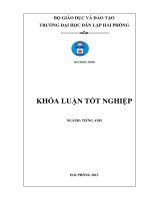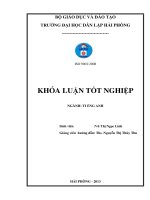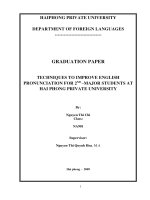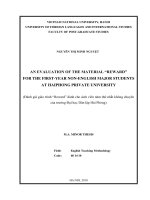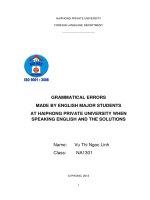Grammatical errors made by english major students at hai phong private university when speaking english and the solutions
Bạn đang xem bản rút gọn của tài liệu. Xem và tải ngay bản đầy đủ của tài liệu tại đây (768.86 KB, 61 trang )
HAIPHONG PRIVATE UNIVERSITY
FOREIGN LANGUAGE DEPARTMENT
-----------------------------------
GRAMMATICAL ERRORS
MADE BY ENGLISH MAJOR STUDENTS
AT HAIPHONG PRIVATE UNIVERSITY WHEN
SPEAKING ENGLISH AND THE SOLUTIONS
Name:
Class:
Vu Thi Ngoc Linh
NA1301
AI PHONG, 2013
1
HAIPHONG PRIVATE UNIVERSITY
FOREIGN LANGUAGE DEPARTMENT
-----------------------------------
GRAMMATICAL ERRORS
MADE BY ENGLISH MAJOR STUDENTS
AT HAIPHONG PRIVATE UNIVERSITY WHEN
SPEAKING ENGLISH AND THE SOLUTIONS
Name:
Class:
Vu Thi Ngoc Linh
NA1301
Supervisor: Nguyen Thi Thuy Thu, M.A
HAI PHONG, 2013
2
ACKNOWLEDGEMENTS
During the process of fulfilling this graduation paper, I have received
many necessary assistances previous ideas and timely encouragement from my
teachers, family and friends.
First and foremost, I would like to send my deep gratitude to Mrs. Nguyen
Thi Thuy Thu, the supervisor of this graduation paper. Her detailed comments
and useful advice have helped me shape my ides and realize my aims. She has
also provided me with many useful materials as well as encouraged and created
favorable conditions for me to fulfill this research. Therefore, it is an undeniable
fact that this paper would have not been completed without her invaluable
support.
Secondly, I would like to show my sincere thanks to Dr. Tran Thi Ngoc
Lien _leading Board of Department of Foreign Language for giving me a chance
to do the thesis. Also, I would like to express my particular thanks to all the
lectures of the Department whose lectures have enriched my academic
knowledge of English during the past four years.
In addition, I warmly thank all my friends for their encouragement and
precious assistance throughout the process of writing the thesis. Their material
and spiritual support is a great driving – force for me. Especially, I wish to thank
over … the first and the second year students in Department for their
enthusiastic and effective cooperation in the process of completing the survey
questionnaires.
Finally, I am greatly indebted to my parents, who have encouraged and
supported me to fulfil this graduation paper.
Student
Vu Thi Ngoc Linh
3
PART I: INTRODUCTION
1. Rationale
Language is a typical and essential product of each nation because it is the
individual feature of each country. When learning a foreign language, it is
necessary for learners to learn four skills: listening, speaking, reading and
writing. Thank to it, learners can master and use this foreign language. In all
four skills, speaking can be considered to be the skill which requires learners to
spend very much time learning and practicing. Most of the students face up with
the difficulties in studying speaking at first. In fact, studying speaking well is
one of the key which helps learners step by step discover this interesting
language.
Moreover, English is not easy to learn because English grammar is rather
complicated. In fact, many English learners have the misconception that when
they have memorized many grammar structures and can write well, they can
speak well. Yet, when they stand up to speak on something, things do not appear
to be as easy as they expected. Sometimes, learners can speak on something and
feel satisfied their speeches after finishing them. But they rarely take notice of or
even recognize some sentence problems related to grammar structures that may
occur. With the hope that learners can find out some experiences of grammatical
errors during speaking and of being corrected, a study on “Grammatical errors
made by English major students at Hai Phong Private University when
speaking English and the solutions” is chosen as the topic of this graduation
paper.
4
2.Aims of the study
This study aims at:
Providing learners an overview of English sentences and some parts of
speech in English sentences (particularly Subject and Verb).
Analyzing most common grammatical errors in English sentences during
speaking related to Subject and Verb.
Giving some causes and suggested solutions to overcome these mistakes,
to help English major students in HPU with promoting and enhancing English
speaking skill.
3. Methods of the study
_ A survey was conducted for the 1st and 2nd English major students at HPU
about grammatical errors when speaking English and the solutions. The survey
questionnaire has been designed as the key data collection instrument of the
study. Collecting and analyzing data have been used.
_ Interviewing students.
_ Consulting several ideas with supervisor.
_ Gathering information through reference books and related Websites.
4. Scope of the study
In the communication, the mistakes made by learners are unavoidable.
Thus, we had better look at the mistakes, a part of learning English, to answer
the questions: causes and how to correct them. There are many different types of
errors
during
speaking
English:
Lexical
errors,
grammatical
errors,
pronunciation errors, written errors… However, for the limitation of knowledge
and experience, I am not capable of studying all. Therefore, only the
grammatical mistakes related to Subject and Verb are covered in this graduation
paper.
5
5.
Design of the study
The study consists of three parts: Introduction, Development, Conclusion
Part I: Introduction on showing reasons to choose the study, aims, methods,
scope and design of the study.
Part II: The main part of the study: including four chapters
Chapter I: The theoretical background of English sentences
Chapter II: Common grammatical errors related to Subject and Verb in
sentence
Chapter III: Data collection and analysis
- Comment on the interview and survey questionnaires
- Data collection and analysis
- Main findings
Chapter IV: Some suggested solutions
Part III: Summarize and make a conclusion to the main points which have
been explored in the study, propose recommendations to develop the
effectiveness of teaching and learning English.
6
PART II: DEVELOPMENT
CHAPTER I:
THEORETICAL BACKGROUND
I.1. Understanding speaking skill
―Speaking is the productive skill in the oral mode. It, like the other skills,
is more complicated than it seems at first and involves more than just
pronouncing words‖. (Bygate. M, 2009: 3)
There are three kinds of speaking situations in which we find ourselves:
_ Interactive,
_ Partially interactive, and
_ Non-interactive.
―Speaking in a second language involves the development of a particular
type of a communication skill. It has occupied a peculiar position throughout
much of the history of language teaching. Speaking is a skill which deserves
attention every bit as much as literary skills, in both first and second languages.
Ours learners often need to be able to speak with confidence in order to carry
out many of their most basic transactions. It is the skill by which learners are
most frequently judged and through which they make and lose friends‖ (Bygate.
M, 2009: 3)
According to Oxford Advanced Learner‘s Dictionary (2005), ―speaking is
the activity of using voice to say something‖
7
Speaking, as stated by Chaney & Burd (1998) is ―the process of building
and sharing meaning through the use of verbal and non-verbal symbols, in a
variety of contexts‖.
―Speaking is an interactive process of constructing meaning that involves
producing and processing information‖ (Brown 1994; Burn & Joyce 1997).
I.2. Sentence definitions
We have used sentences all our life to communicate our ideas in both
spoken and written language. There are different ways to define a sentence but
we would prefer a traditional grammar-based definition:
―The sentence is the largest grammatical unit which expresses a complete
thought or idea and has a definite grammatical form (one finite verb, one
subject) and a certain intonation. It could be said in another way that the
sentence is a unit of speech which expresses a more or less complete thought
and has a definite grammatical form and a certain intonation. Every sentence
shows the relation of the statement to reality from the point of view of the
speaker‖.
( />Element is usually a small amount of something, thus, sentence element is
a small amount of sentence. A sentence may alternatively be seen as comprising
five units called elements of sentence. Structure: subject, verb, complement,
object and adverbial, which are abbreviated as S, V, C, O, A.
Ex:
John carefully searched the room.
S
A
V
O
8
The girl is now a student at a large university.
S
V A
C
A
(Henno Parks, 2010)
I.2.1. Subject
―Subject is identified syntactically by the features of position, concord,
pronominalisation and reflection in tag questions. Semantically, almost all
participant roles can be associated with the subject. It can be realized by a wide
variety of group and clauses‖. (Angela Downing and Philip Locke, 2006)
According to Oxford Advanced Learner‘s dictionary, ―subject is word(s)
in a sentence naming who or what does or undergoes the action stated by the
verb, or word(s) in a sentence about which something is stated‖.
Ex:
I am keeping most of my money in the blank.
They are placing the blame on us.
The kettle is now on the store.
As A Comprehensive Grammar of the English Language stated, ―the
subject is often described as the constituent defining the topic of the sentence _
that which the sentence is ―about‖ and which it presupposes as its point of
departure‖. Contrary to the above definition, which is more about syntactic, this
one is more about semantic part of the sentence.
Subject can be expressed by a wide variety of groups and clauses but it‘s
usually a noun or a pronoun.
9
Subjects determine number (singular or plural) and person concord with
the verb. Concord is manifested only in those verb forms which show
inflectional contrast:
Ex:
The librarian/ he/ she has checked the book.
The librarians/ I/ you/ we/ they have checked the book.
I.2.2. Verb
Verb is word or phrase indicating an action, an event or a state, or a
condition of the subject such as bring, do, eat, play, sleep, etc.
Ex:
She left yesterday.
He eats two sweet cakes.
Did they leave yesterday?
She will leave tomorrow.
According to Quirk. R (2010: 134 ), ―verb, as a class of words, can be
divided into three major categories, according to their function within the verb
phrase, we distinguish the open class of FULL VERBS (or lexical verbs) such as
leave from the closed classed of PRIMARY VERBS (be, have and do) and of
MODAL AUXILIARY VERBS (will, might, can, etc)‖. Of these three classes,
the full verbs can act only as main verbs, and the primary verb can act as either
main verbs or an auxiliary verb‖.
Primary verb: have, do, be:
Form: have, has, had
do, does, did
be, am , is, are, was, were, been, being
10
Modal auxiliary verb: can, could, may, might, must, shall, should, will, would,
ought to
In addition to this, some verbs (variously termed marginal modals, semiauxiliaries, etc) have a status intermediate between that of main verbs and that of
auxiliaries.
As with most meaning-based criteria, the semantic definition above is
somewhat misleading. For instance, nouns divided from verbs through zero
derivation (strike, kick, throw) will maintain their verbal sense of action. Like
nouns, verbs have a limited potential for taking inflectional endings. English has
below inflections for verbs:
_ Base form (we symbolize verbs with this inflection as V)
Ex:
I play that game.
_ -S form : Third person singular present tense (we symbolize verbs with this
inflection as Vs)
Ex:
Ann plays that game very well.
_ Past tense (we symbolize verbs with this inflection as V-ed)
Ex:
Ann played that game last night.
_ Present participle form (we symbolize verbs with this inflection as V-ing)
Ex:
Ann is playing that game now.
_ Past participle form (we symbolize verbs with this inflection as V-en)
Ex:
Ann has played that game since 2010.
Traditionally, V-ing is sometimes called the progressive since it is often
used to form the progressive verb structure, as in is playing. However, V-ing
also occurs in structures traditionally known as gerunds. Only the progressive
use of ing is regard as an inflection.
11
Also, V-en has been called the past participle form of the verb. However,
V-en can function as the head of the verb phrase.
The ability to accept these inflections is sufficient to qualify a word as a
verb in English. However, because of both zero derivation and identical spelling
of certain derivational endings, it will always be necessary to confirm that a
word in a specific sentence is actually a verb. Therefore, a word is a verb if it
actually ends in a verb inflection.
We must distinguish between main verbs and auxiliary verbs. The main
verbs can appear themselves in a verb phrase; an auxiliary verb regularly
appears only preceding a main verb.
I.3. What is concord?
―Concord (also termed agreement) can be defined as the relationship
between two grammatical units such that one of them displays a particular
feature that accords with a displayed feature in the other‖. (Quirk.R, 2010)
Ex: Economics has become an increasingly popular course at university.
I know what is on your mind
There are five kinds of concord: subject – verb concord, subject – object
concord, subject – subject complement and object – object complement concord,
distributive concord, and pronoun concord.
I. 4. Significance of grammar in speaking English
I.4.1. To maintain uniformity
If everyone starts using language as per his/her own whims and fancies,
then the language will have too many variations. It will give language an
ambiguity and vagueness. More than that, we would have miscommunications
12
and communication problems, as no one language would be accepted as a
universal standard.
I.4.2. To be legible
If the language doesn‘t make sense, it will not work. An improperly
constructed sentence may not communicate the intended information to the
listener or reader. Use of wrong words or mismatched punctuation can actually
change
the
entire
meaning
of
the
sentence,
thereby
leading
to
miscommunication. You need to understand that the end purpose of grammar is
communication of thoughts and ideas through language. If you are not
understood, then the whole point of communication is lost. Imagine you going to
a distant land and using a dictionary of local language to talk. You may pick the
right words but the way you put them together can be really funny or even
dangerous.
I.4.3. To Sound Good & Interesting
A grammatically sound piece of prose or verse sounds good and
interesting. When you are talking or writing something without proper grammar,
it actually makes the recipient disinterested. For the language to have a flow and
seem interesting, it is very necessary to abide by the rules of grammar in the
sentences. The communication becomes ineffective, if the other person is
disinterested in what you are putting forth.
I.4.4. Professionalism
Language used in business and professional speaking and documents
should be free from any grammatical error, as the whole responsibility of
pushing deals through and effective interrelated work is dependent on these
documents and discussions.
()
13
CHAPTER II:
COMMON GRAMMATICAL ERRORS RELATED TO SUBJECT
AND VERB IN SENTENCE
II.1. Mistakes in combination between Subject and Verb
II.1.1. Subject is not defined clearly
Normally, the subject in this case is a Noun phrase: a flock of birds, the
hand of bananas… so learners often consider birds or bananas as the subject of
sentence. Another situation is that the subject of sentence is Noun without
signals of number: license, memoranda… also causes mistake in defining the
number of Verb.
Incorrect: A flock of birds are flying in the sky.
(The subject of this sentence – A flock of birds – is singular, so the Verb must
be singular)
Correct: A flock of birds is flying in the sky
Incorrect: The memoranda is not important.
Correct: The memoranda are not important.
Some examples:
The study of languages is very interesting.
Serveral theories on this subject have been proposed.
The view of these disciplines varies from time to time.
The danger of forest fires is not to be taken lightly.
Some words like that: flock of birds/ sheep, school of fish, herd of cattle, pride
of lions, pack of dogs.
14
In order to define clearly the Subject in this case, learners should consider
carefully the number of Noun which is used as the Subject of sentence. Then,
they can decide whether the Verb is singular or plural.
( />II.1.2. Elements standing between subject and Verb
In spoken and written English, sentence with elements standing between
subject and verb should be used carefully. The mistake may happen when
learners combine these elements with the main subject of sentence and place this
whole phrase as the subject of sentence. Let‘s see the following example:
Ex:
She, as well as us, feels sad when he leaves.
(In this sentence, the subject – She – is singular, so the verb must be singular.
The phrase “as well as” is only the modifier for the subject, therefore, it does
not play as subject of sentence.)
Incorrect: Miss Ann, together with some friends are having a big party.
Correct: Miss Ann, together with some friends is having a big party.
Some words like that: together with, along with, as well as, accompanied by
Ex: Mary, along with her manager and some friends, is going to a party
tonight.
Mr. Robbins, accompanied by her wife and children, is arriving tonight.
( />To correct this type of mistake, it is necessary to understand that elements
standing between Subject and verb are only the additional information to clarify
the main Subject. So, please ignore this part and pay more attention to the main
Subject.
15
Incorrect:
His father, as well as his mother and his brother, like
listening to the music.
Correct:
His father, as well as his mother and his brother, likes
listening to the music.
II.1.3. Elements of subject are connected to each other by the conjunction
“or”
If there are two nouns or pronouns as subject of a verb and they are
connected to each other by the conjunction ―or‖, the one which stands closely to
the Verb will decide the verb.
Ex: You or he is to feed the cat.
Incorrect: We or John are certain to be punished.
Correct: We or John is certain to be punished.
( />The principal of this circumstance lies on the conjunction ―or‖. It splits
sentence into two clauses:
Ex: You or he is to feed the cat.
can be paraphrased: “You are to feed the cat or he is to feed the cat”
Therefore, learners should rewrite the sentence in full form if they could not be
confident about their choice of Verb.
Incorrect: Jimmy or you is to see them off at the airport.
Correct: Jimmy or you are to see them off at the airport.
16
II.1.4. Indefinite Pronouns
any + singular noun
no + singular noun
some + singular noun
anybody
anyone
anything
nobody
no one
nothing
somebody
someone
something
everybody
every + singular noun
everyone
each
everything
either
neither
Ex: Everybody who wants to buy a ticket should be in this line.
Something is in my eye.
Anybody who has lost his ticket should report to the desk.
Neither of his pens is able to be used.
If either of you takes a vacation now, we will not be able to finish the
work.
No problem is harder than this one.
Nobody works harder than John does.
()
II.1.5. “None” and “No”
―None‖ and ―No‖ are both used with singular and plural Nouns
None of the + non-count noun + singular verb
None of the + plural count noun + plural verb
17
Ex: None of the counterfeit money has been found.
None of the students have finished the exam yet.
No + {singular noun / non-count noun} + singular verb
No + plural noun + plural verb
Ex:
No example is relevant to this case.
No examples are relevant to this case.
(Angela Downing and Philip Locke, 2006)
II.1.6. V-ing is used as Subjects
When V-ing is used as Subjects, verbs in the sentences must be 3 rd person
singular Verbs.
Ex:
Knowing her has made him what he is.
Not studying has caused him many problems.
Washing with special cream is recommended for scalp infection.
Being cordial is one of his greatest assets.
Writing many letters makes her happy.
()
II.1.7. Collective Noun and definition of “collective”
A collective noun, as its name, indicates two or more people, objects, or
ideas, etc. In general, the collective Noun is regarded as a singular Noun,
therefore it requires a verb in singular form.
Ex: The committee has had a meeting and it has rejected the proposal.
However, sometimes, the collective Noun refers to the plural and in this case the
Verb must be plural.
Ex: The club are discussing the tasks.
18
Following is the mistake in using collective Noun
Incorrect: The jury are giving their verdict now.
Correct:
The jury is giving its verdict now
There are some Nouns refer to a group or organization. In fact, they are singular
Nouns. Therefore, pronouns or verbs after them will be 3rd person singular
Congress
family
group
committee
class
Ex:
Organization
team
army
club
crowd
Government
jury
majority
minority
public
The committee has met, and it has rejected the proposal.
The family was elated by the news.
The crowd was wild with excitement
Congress has initiated a new plan to combat inflation.
The organization has lot many members this year.
Our team is going to win the game.
However we should remember some complicated cases that:
The majority + singular verb
The majority of the + plural noun + plural verb
Ex:
The majority believes that we are in no danger.
The majority of the students believe him to be innocent.
All the collective noun of time, money, measurement, etc… when
referring to it as a unity is used as a singular noun. Hence the verbs and
pronouns followed them must be the 3rd person singular.
19
Ex:
Twenty-five dollars is too much for the meal.
Fifty minutes isn‘t enough time to finish this test
Twenty dollars is all I can afford to pay for that radio.
Two miles is too much to run in one day.
If above Subjects refer to the whole collection, the Verb is singular.
However, if they refer to the member of the collection, the Verb is plural.
The outstanding feature to remember is that when Subject is a collective
Noun, the Verb can be either singular or plural. Therefore, the decision of Verb
depends on the presence of collective Noun on sentence.
( grammar/parts – of speech.htm)
II.1.8. “A number of” and “The number of”
A number of + plural noun + plural verb
Ex: A number of students are going to the class picnic
A number of applicants have already been interviewed.
The number of + plural noun + singular verb…
Ex: The number of days in a week is seven.
The number of residents who have been questioned on this
matter is quite small.
II.1.9. “There is” and “There are”
When we use sentence with ―there is‖ and ―there are‖ we often refer to the order
like that:
Ex:
There are books in the bag.
However, the above order is reversely used, not in natural order:
Ex: Books are there in the bag.
So, it makes learners distracted in recognizing the Subject.
20
Here is the similar case:
Incorrect: There is a few errors in this paragraph.
Correct:
There are a few errors in this paragraph.
Some structures related to ―There is‖: there is certain/ sure/ likely/ bound to be
Ex: There is sure to be trouble when she gets his letter.
Do you think there is likely to be snow.
(Henno Parks, 2010)
To correct a lack of subject/verb agreement, learners must identify the
subject of the verb and then change the verb to agree with that subject. Do not
be fooled by words that may come between the subject and the verb.
II.2. Common mistakes in tense usage
The term ―tense‖ simply indicates the time. Therefore, we form a
relationship in time in utterance or speech by using the correct tense of Verb.
According to Quirk. R (2010), there are only 2 main tenses in English:
present and past tense which cannot be considered separately from 4 aspects
(denote the manner in which the action is performed): simple, progressive,
perfective progressive aspect.
Aspect/
tense
Present
Simple
Progressive
Perfect
V, Vs
am, is, are + Ving
have/ has + Ved2
Perfect
Progressive
have/ has +
been+ Ved2
had been +
Past
Ved1
was/ were + Ving
had + Ved2
Ved2
There is no obvious future tense in English corresponding to the time/
tense relation for present and past. Instead there are several possibilities for
21
denoting future time. Futurity, modality, and aspect are closely related, and
future time is rendered by means of modal auxiliaries or semi-auxiliaries, or by
simple present forms or progressive forms.
II.2.1. Shift in tense
Shift in tense occurs when learners combine two or more tenses which are
not synchronic in a sentence.
Incorrect: She promised she will not tell anyone my secret.
Correct:
She promised she would not tell anyone my secret.
()
Unless required by context, learners should be consistent in using tense or
combining tenses in a sentence, avoid making mistake by shifting tense.
II.2.2. The general truth
The general truth is an event happening in the past or in the present and in
great possibility will happen in the future.
Ex:
The sun rises at the East
Water freezes at 0oC
Fire is hot
The general truth often causes difficulties to a sentence in the past tense
because learners tend to use the past tense to express the general truth in this
case.
Incorrect: Last week, our clearyman reminded us that living the upright
life was a discipline
22
Correct:
Last week, our clearyman reminded us that living the upright
life is a discipline
The general truth often remains for a long time, so that it always requires the
verb in the present tense.
Incorrect: Professor Jacques told us yesterday that iodine was effective
in removing silver nitrate stains.
Correct: Professor Jacques told us yesterday that iodine is effective in
removing silver nitrate stains.
()
II.2.3. Mistakes between the present perfect tense and the simple past tense
Present Perfect Simple
Past Simple
Unfinished actions that started in Finished actions:
the past and continue to the present:
I knew Julie for ten years (but
I've
known Julie
for
ten
then she moved away and we
years (and I still know her).
lost touch).
A finished action in someone's life A finished action in someone's life
(when the person is still alive: life (when the person is dead):
experience):
My great-grandmother went to
My
brother has
been to
Mexico three times.
Mexico three times.
23
A finished action with a result in A finished action with no result in the
the present:
present:
I've lost my keys! (The result
I lost my keys yesterday. It was
is that I can't get into my
terrible! (Now there is no
house now).
result.
I
got
new
keys
yesterday).
With an unfinished time word (this With a finished time word (last week,
week, this month, today):
last month, yesterday):
I've seen John this week.
I saw John last week.
()
We use the past simple for past events or actions which have no connection to
the present and the present perfect for actions which started in the past and are
still happening now OR for finished actions which have a connection to the
present. Moreover, we can not use the present perfect with a finished time word
Ex (NOT): I've been to the museum yesterday.
Some examples:
I have been a teacher since 1989
I have already seen that movie
Most has just finished his homework
The value of the Johnsons‘ house has doubled in the last four years.
The mistakes occurs when learners use the simple past tense in the sentence
which requires the present perfect tense
Incorrect: I did not drink any coffee so far today
24
Correct:
I have not drunk any coffee so far today
Therefore, learners have to distinguish between the use of the present
perfect tense and the simple past tense. There always have some signals to
highlight the form of these two tenses. While the former is marked by adverbs of
time: just, already, yet, for, since, etc…, the later is the presence of: yesterday,
last (week/ month/ year/ etc).
II.3. Common mistakes in voice usage
Inappropriate passive or active voice
The active and passive voice are not grammatically correct or incorrect;
however, speakers often choose inappropriately which voice to use. The passive
voice has the effect of removing the actor from the subject position or from the
sentence entirely. This removal is appropriate in certain situations, particularly
in science and business. Otherwise, you should typically use the active voice.
Incorrect: I poured the solution into the beaker.
(The active voice would be inappropriate here if this is part of a lab report. In
science writing, the person performing an experiment should be irrelevant to the
process.)
Correct: The solution was poured into the beaker.
(Using the passive voice, the "I" can be removed from the sentence.)
Incorrect: Native Americans were repeatedly pushed further west.
(Removing the actor from this sentence is inappropriate because it is important
here to know who caused this action to occur. )
Correct: European settlers repeatedly pushed Native Americans
further west.
(Using the active voice makes it clear who caused the action.)
( />25
